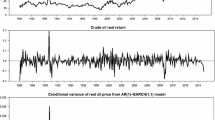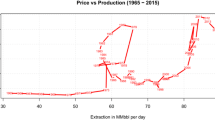Abstract
In this paper, new approaches are taken to explore two new dimensions of the oil growth nexus that are relevant when focusing on oil producing countries. Based on panel regressions, we regress per capita income on the ratio of oil production to primary energy consumption and oil rents per capita, adding control variables and exploring a relationship analysis within a multivariate oil-growth nexus framework. The per capita oil consumption-economic growth nexus is examined in a panel of oil producing countries over a long time span (1970–2012), controlling for the exports of goods and services, the ratio of oil production to primary energy consumption, the oil rents, and international crude oil prices. The phenomenon of cross-sectional dependence that is present in the panel confirms that these countries share common spatial patterns, unobserved common factors, or both. The cointegration/long memory relationships, as well as the panel data estimators’ appropriateness, are both analysed and discussed. A dynamic Driscoll-Kraay estimator, with fixed effects, is shown to be adequate to cope with the phenomena of heteroskedasticity, contemporaneous correlation, first order autocorrelation and cross-sectional dependence, present in the panel. Oil consumption drives economic growth, but only on the short-run. The ratio of oil production to primary energy consumption has exerted a positive impact on growth in both the short- and long-run. Oil prices only exert a positive effect on growth in the short-run. Oil rents depress growth in both the short- and long-run, suggesting that it is more a curse than a blessing for the economies.
Similar content being viewed by others
References
Acemoglu D, Johnson S, Robinson JA (2001) Colonial origins of comparative development: an empirical investigation. Am Econ Rev 91(5):1369–1401
Al Jaber S (2013) MENA energy transition strategy: a call for leadership in energy innovation. Energy Strategy Rev 2(1):5–7
Alexeev M, Conrad R (2009) The elusive curse of oil. Rev Econ Stat 91(3):586–598
Al-Mulali U (2011) Oil consumption, CO2 emission and economic growth in MENA countries. Energy 36(10):6165–6171
Anselin L (2001) Spatial econometrics. In: Baltagi B (ed) A companion to theoretical econometrics. Blackwell, Oxford, pp 310–330
Apergis N, Payne JE (2009) Energy consumption and economic growth in Central America: evidence from a panel cointegration and error correction model. Energy Econ 31(2):211–216
Arezki R, Gylfason T (eds) (2011) beyond the curse policies to harness the power of natural resources, Washington DC, International Monetary Fund. https://notendur.hi.is/gylfason/Beyond_the_Curse_Arezki_Gylfason_Sy.pdf. Accessed 11 April 2013
Bahmani-Oskooee M, Jamilov R (2014) Export diversification and the S-curve effect in a resource-rich state: evidence from Azerbaijan. Econ Change Restruct 47(2):135–154
Baltagi BH (2008) Econometric analysis of panel data, 4th edn. Wiley, Chichester
Beblawi HE (2008) Economic Growth in Egypt: Impediments and Constraints (1974–2004). The International Bank for Reconstruction and Development/World Bank—On behalf of the Commission on Growth and Development. Working Paper No. 14
Blackburne EF III, Frank MW (2007) Estimation of non-stationary heterogeneous panels. The Stata J 7(2):197–208
Brunnschweiler C, Bulte E (2008) The resource curse revisited and revised: a tale of paradoxes and red herrings. J Environ Econ Manag 55(3):248–264
Choi I (2001) Unit root tests for panel data. J Int Money Finance 20(1):249–272
Ciarlone A (2011) Housing wealth effect in emerging economies. Emerg Mark Rev 12(4):399–417
Corden W, Neary J (1982) Booming sector and de-industrialization in a small open economy. Econ J 92(368):825–848
Damette O, Seghir M (2013) Energy as a driver of growth in oil exporting countries? Energy Econ 37:193–199
Darbouche H (2013) MENA’s growing natural gas deficit and the issue of domestic prices. Energy Strategy Rev 2(1):116–121
Driscoll J, Kraay AC (1998) Consistent covariance matrix estimation with spatially dependent data. Rev Econ Stat 80(4):549–560
Eberhardt M (2011) Panel time-series modeling: new tools for analyzing xt data, 2011 UK Stata Users Group meeting
Eberhardt M, Presbitero AF (2013) This Time They Are Different: Heterogeneity and Nonlinearity in the Relationship Between Debt and Growth. IMF Working Paper 13/248
ECB (2010). Energy markets and the Euro area macroeconomy. Occasional Paper Series, 113/June, European Central Bank
El-Katiri L (2013) Energy sustainability in the Gulf States: the why and the how, Oxford Institute for Energy Studies. http://www.oxfordenergy.org/wpcms/wp-content/uploads/2013/03/MEP_4.pdf. Accessed 21 Jan 2014
Esfahani HS, Mohaddes K, Pesaran MH (2013) Oil exports and the Iranian economy. Q Rev Econ Finance 53(3):221–237
Esfahani HS, Mohaddes K, Pesaran MH (2014) An empirical growth model for major oil exporters. J Appl Econom 29(1):1–21
Fattouh B, El-Katiri L (2013) Energy subsidies in the Middle East and North Africa. Energy Strategy Rev 2(1):108–115
Frankel J (2010) The natural resource curse: a survey. NBER Working Paper Series, Working Paper 15836
Friedrichs J, Inderwildi OR (2013) The carbon curse: Are fuel rich countries doomed to high CO2 intensities? Energy Policy 62:1356–1365
Fuinhas JA, Marques AC (2013) Rentierism, energy and economic growth: the case of Algeria and Egypt (1965–2010). Energy Policy 62:1165–1171
Fuinhas JA, Marques AC, Couto AP (2015) Oil-growth nexus in oil producing countries: macro panel evidence. Int J Energy Econ Policy 5(1):148–163
Gately D, Al-Yousef N, Al-Sheikh HMH (2013) The rapid growth of OPEC′s domestic oil consumption. Energy Policy 62:844–859
Hsiao C (2003) Analysis of panel data, 2nd edn. Cambridge University Press, Cambridge
IEA (2013) World Energy Outlook 2013. The International Energy Agency, IEA Publications, Paris
Ismail K (2010) The structural manifestation of the ‘Dutch Disease’: the case of oil exporting countries. IMF Working Paper WP/10/103
Kao C (1999) Spurious regression and residual-based tests for cointegration in panel data. J Econom 90(1):1–44
Klein N (2010) The linkage between the oil and non-oil sectors—a panel VAR approach. IMF Working Paper, WP/10/118
Klevmarken NA (1989) Panel studies: What can we learn from them? Introduction. Eur Econ Rev 33(2–3):523–529
Larsen E (2004) Escaping the resource curse and the Dutch Disease? When and why Norway caught up with and forged ahead of its neighbors. Discussion Papers No. 377, Statistics Norway, Research Department
Levin A, Lin C-F, Chu C-SJ (2002) Unit root test in panel data: asymptotic and finite-sample properties. J Econom 108(1):1–24
Luft G, Korin A (2009) Turning oil into salt: energy independence through fuel choice. BookSurge Publishing, South Carolina
Maddala GS, Wu S (1999) A comparative study of unit root tests with panel data a new simple test. Oxf Bull Econ Stat 61(S1):631–652
Magud N, Sosa S (2010) When and why worry about real exchange rate appreciation? The missing link between Dutch disease and growth. IMF Working Paper, WP/10/271
Mehrara M (2007) Energy consumption and economic growth: the case of oil exporting countries. Energy Policy 35(5):2939–2945
Mohammadi H, Parvaresh S (2014) Energy consumption and output: evidence from a panel of 14 oil-exporting countries. Energy Econ 41:41–46
Moscone F, Tosetti E (2010) Health expenditure and income in the United States. Health Econ 19(2):1385–1403
Narayan PK, Smyth R (2008) Energy consumption and real GDP in G7 countries: new evidence from panel cointegration with structural breaks. Energy Econ 30(5):2331–2341
Narayan P, Sharma S, Poon W, Westerlund J (2014) Do oil prices predict economic growth? New global evidence. Energy Econ 41:137–146
Ozturk I (2010) A literature survey on energy-growth nexus. Energy Policy 38(1):340–349
Ozturk I, Aslan A, Kalyoncu H (2010) Energy consumption and economic growth relationship: evidence from panel data for low and middle income countries. Energy Policy 38(8):4422–4428
Papapetrou E (2013) Oil prices and economic activity in Greece. Econ Change Restruct 46(4):385–399
Pedroni P (1999) Critical values for cointegration tests in heterogeneous panels with multiple regressors. Oxford Bull Econ Stat 61(Special Issue):653–670
Pedroni P (2004) Panel cointegration; asymptotic and finite sample properties of pooled time series tests with an application to the PPP hypothesis. Econom Theory 20(3):597–625
Pesaran MH (2007) A simple panel unit root test in the presence of cross-section dependence. J Appl Econom 22(2):265–312
Pesaran MH, Shin Y, Smith RP (1999) Pooled mean group estimation of dynamic heterogeneous panels. J Am Stat Assoc 94(446):621–634
Ross M (2001) Does oil hinder democracy? World Polit 53(3):297–322
Smith B (2014) Dutch disease and the oil and boom and bust. OxCarre Research Paper 133, Oxford Centre for the Analysis of Resource Rich Economies
Stevens P (2003) Resource impact: Curse or blessing? A literature survey. J Energy Lit IX(1):3–42
STRATFOR (2014) When oil prices drop, some countries lose. http://www.stratfor.com/sample/analysis/when-oil-prices-drop-some-countries-lose. Accessed 3 Dec 2014
Torvik R (2001) Learning by doing and the Dutch disease. Eur Econ Rev 45(2):285–306
Westerlund J (2007) Testing for error correction in panel data. Oxf Econ Stat 69(6):709–748
Wolde-Rufael Y (2009) Energy consumption and economic growth: the experience of African countries revisited. Energy Econ 31(2):217–224
World Bank (2011) The Changing Wealth of Nations: Measuring Sustainable Development in the New Millennium, Washington DC
Yıldırım E, Sukruoglu D, Aslan A (2014) Energy consumption and economic growth in the next 11 countries: the bootstrapped autoregressive metric causality approach. Energy Econ 44:14–21
Yuan C, Liu S, Xie N (2010) The impact of chinese economic growth and energy consumption of the Global Financial Crisis: an input–output analysis. Energy 35(4):1805–1812
Zhang X, Cheng X (2009) Energy consumption, carbon emissions and economic growth in China. Ecol Econ 68(10):2706–2712
Acknowledgments
The financial support of the NECE-UBI—Research Unit in Business Science and Economics, sponsored by the Portuguese Foundation for the Development of Science and Technology, Ministry of Education and Science, is acknowledged. We are grateful to two anonymous referees for their useful comments.
Author information
Authors and Affiliations
Corresponding author
Appendix
Rights and permissions
About this article
Cite this article
Fuinhas, J.A., Marques, A.C. & Couto, A.P. Oil rents and economic growth in oil producing countries: evidence from a macro panel. Econ Change Restruct 48, 257–279 (2015). https://doi.org/10.1007/s10644-015-9170-x
Received:
Accepted:
Published:
Issue Date:
DOI: https://doi.org/10.1007/s10644-015-9170-x




